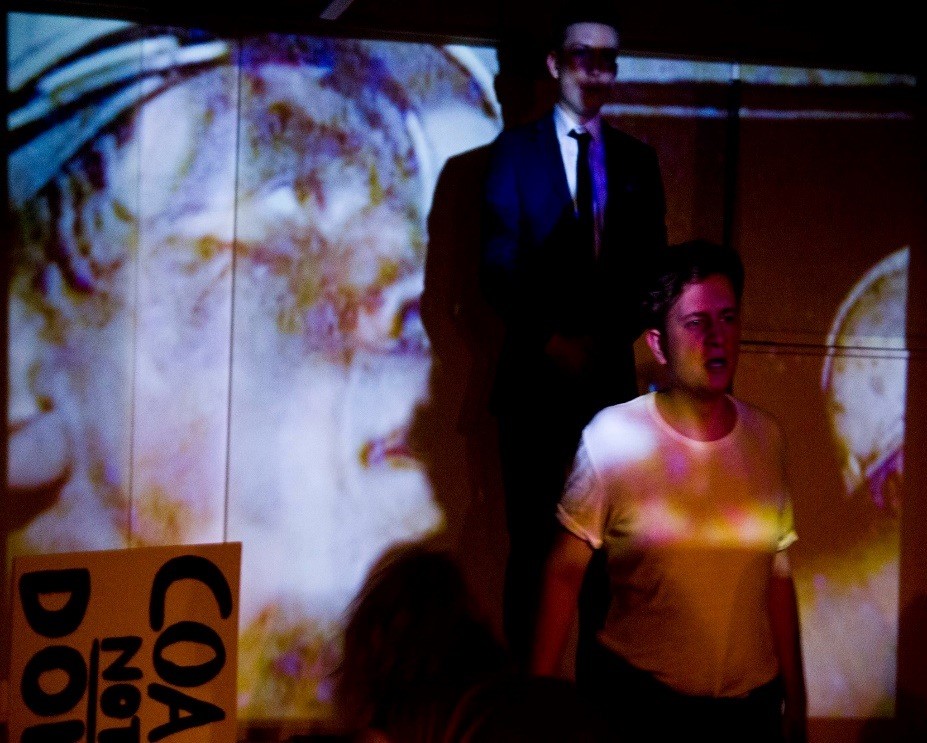
“To box myself creatively would be a hindrance to myself,” contemplates part-time director, full-time University of Manchester student Monique Touko, as she considers her position in the drama world.
She wants to take on themes that are seen as ‘universally relevant’ such as the family, politics and institutions, and not themes that are exclusively black. “The world already boxes me in, I don’t wish to adhere to that,” Touko adds.
As Idris Elba stated recently: “You never say he’s a white actor, you just say he’s an actor.” The same can be applied to those behind the scenes in the theatre world.
Comedy, clamour and corruption make up her recent explosive theatre production of the George Orwell masterpiece, Animal Farm (which took place between the 30 November and the 2 December at the Ziferblat in Manchester).
The performance was executed with enough creative expertise to lead me to question how a university student could be its director. Art and politics collided to produce an Animal Farm that was reworked against the backdrop of 1980s Northern England, during Thatcher’s term in office. Monique carefully merged live music, projection and solid acting, to weave a thought-provoking piece.
From the first scene I was immediately transported to the upheaval of the 1980s miner’s strike. The ‘animals’ on stage furiously waved placards sporting ‘COAL NOT DOLE’. Tensions were further heightened by the frenetic beat of the drum, which provided the undercurrent to the play’s most dramatic moments.
Meanwhile, the projector beams actual footage of the strike and Prime Minister Margaret Thatcher’s speeches onto the far back wall, intensifying the atmosphere. This sense of urgency was maintained throughout the production: from the animal’s initial revolt against the owner of Manor House and their brave defence of what they reclaim and rename Animal Farm, to the mutual discontent when the farm reverts back to its former state at the hands of the greedy pigs.
This desperate need for the oppressed to rebel against the political ideologies that suffocate them was practically tangible in the audience, and reflected through each actor. Furthermore, the play’s gluttonous, power crazed protagonist, Napoleon, was presented with enough vigour to mirror the Iron Lady herself.
According to Touko, being a black director comes with a burden to only take on specifically black issues when what is actually required is versatility. When black topics do end up being brought into the forefront on stage, Touko knows she can approach them “from an informed perspective that breaks away from the generalized narrative that equates black with ‘urban’”.
Despite this, her capacity for putting on a production that delves into race issues is limited – the university she’s working within is predominately white, so there is a lack of black actors to fill such roles.
“I would love more than anything to put on a production of this kind,” Touko explains, but says it can only happen when the time is right and the talent is more multicultural.
Until that day presents itself, Touko arguably succeeds in embodying the white working-class struggle during the miner’s strike in her adaptation of Animal Farm.
My only qualms with the production would be attributed to its cramped surroundings. In a piece as dynamic as Animal Farm, the requirement for space should never be underestimated.
Although the confined room made for a more intimate setting, with double the space the play could have gained more movement and stage presence from the actors. Despite this, Touko succeeded in directing a play that was true to the Nelson Bond script, yet still incorporated her own flare.
Her figurative animalisation of the working classes, mixed with the occasional sexual innuendo, gave a light-hearted feel to a serious theme. However, the most crucial aspect of the play is its capacity to be applied to the context of real life. It raises questions such as, why do the greedy always seem to rule? If things remain constant, is uprising futile? And perhaps the most unsettling of questions: is history condemned to repeat itself?









